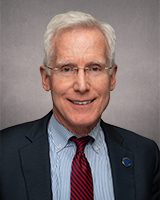GSA Finds New Vaccine Champions at Top Federal Level
By CEO James Appleby, BSPharm, MPH

GSA’s vice president of policy and professional affairs, Patricia “Trish” D’Antonio, was part of a select panel of experts convened recently by Department of Health and Human Services (HHS) Secretary Xavier Becerra to discuss increasing routine vaccinations. Among her many responsibilities, Trish serves as co-chair of the Adult Vaccine Access Coalition (AVAC), which works to strengthen and enhance access to and increase utilization of vaccines among adults. Participation in coalitions like AVAC is one of many ways that GSA is able to amplify its advocacy efforts.
Since the founding of its National Adult Vaccination Program more than a decade ago, GSA has collaborated with the multidisciplinary stakeholder community to raise awareness of the natural immunosenescence that occurs as we age; advocated for policies that increase access to vaccines; and trained champions to stimulate vaccination rates across the life course.
As highlighted during the roundtable, the COVID-19 pandemic has led to a reduction in children and adults getting routine vaccinations, which leaves them more at risk for illness. Such vaccinations are one of the most effective ways to keep us all healthy as we age.
Trish shared that a top AVAC priority has been to eliminate financial barriers that hinder vaccine access and uptake in Medicare and Medicaid, and expressed support for HHS urging Congress to take action to provide all adults access to all Centers for Disease Control-recommended vaccines without cost-sharing. She also highlighted the ongoing need to continue to encourage providers across health care settings to consistently utilize the National Vaccine Advisory Committee Standards for Adult Immunization Practice.
Secretary Becerra underscored his commitment, along with the presidential administration, to work directly with local communities, particularly communities of color and rural communities. Roundtable participants also discussed increasing vaccine confidence, expanding data reporting structures, and improving access to routine vaccinations through school-based vaccine clinics and pharmacy-based systems. They also focused on ways to improve access to public health resources by leveraging the pandemic infrastructure, which all hoped would increase vaccine confidence and uptake across racial, ethnic, geographic, and age groups.